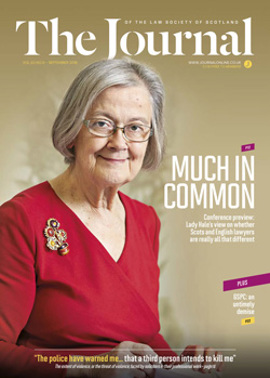Profile: Ryan McCuaig

Tell us a bit about your career so far…
I graduated from the University of Strathclyde in June and I’ll begin the Diploma in Professional Legal Practice at the University of Glasgow in September. I have also secured a traineeship with Thorntons starting in 2019, which I am really excited about.
I currently work as a parliamentary assistant to a Member of the Scottish Parliament. This involves handling constituency casework in a wide range of subject areas such as education, health, housing and justice; providing legal and policy research; and assisting with parliamentary duties such as motions and committees at Holyrood.
Previously I spent two years with BLM as a paralegal in their Litigation department, which I really enjoyed.
What motivated you to become a lawyer?
I have always been interested in the law and how it interacts with every aspect of our day-to-day lives. As someone from a deprived community, I learned early on that the law was something that happened to people like me, rather than something over which we could have agency. I’ve always felt that those perceptions could and should be changed.
I perceive the role of a lawyer to be about people and helping them to solve their problems. That idea of giving people a voice and helping them to assert their rights has always appealed to me.
What have been the highlights of your studies so far?
There have been so many! One of the highlights of my time at Strathclyde Law School has to be the supportive lecturers and staff. I was particularly inspired by Professor Aileen McHarg and Dr Chris McCorkindale, who managed to somehow instill a love of public law into me despite my best efforts to resist. Dr Clare McDiarmid was also an extremely supportive dissertation supervisor.
If I had to choose a favourite moment, it would be graduation. As the first person in my family to go to university, achieving First Class Honours seemed a long way off in first year. Walking across that stage to receive my degree was definitely the proudest moment of my life to date.
How did you become involved with the Lawscot Foundation?
I came across the Foundation on Twitter and reached out to find out more about it. Given my background as a care experienced person who grew up in one of the most deprived areas in Scotland, I am particularly interested in measures which help to widen access to the legal profession. If properly supported, I believe that the Lawscot Foundation has the potential to make a real difference in that area.
I met with Heather McKendrick to donate my old LLB textbooks to the Foundation and it just took off from there, really. I’m now planning to apply for Street Law, have applied to be a Lawscot Foundation mentor, and have joined the fundraising committee.
Do you think the profession can do more to widen access?
I think that the barriers to accessing the legal profession are multi-faceted and multi-layered, so our response as a profession should mirror that. There are structural barriers such as the cost of the Diploma, social barriers such as lack of self-belief or attainment within schools in deprived areas, and there are other unnoticed barriers which are often overlooked. For example, the law society at my university held an annual ball which cost £50 to attend. This excluded many students who were supporting themselves and/or dependants through university. CPD events can often be expensive, even for trainees and students; and most students will spend close to £1,000 on textbooks throughout their LLB.
It’s almost as if at the very foundation of your legal career there emerges a two-tiered system within the profession, between those from more affluent backgrounds and those from lower socio-economic backgrounds. This is not unique to the legal profession, of course, but I hope that we can work towards levelling the playing field.
I think that we have to examine the current route to qualification in Scotland and how accessible that is for people from lower-income backgrounds. The Scottish Government funds your LLB and currently provides a £10,000 loan to all postgraduate students in Scotland, intended to cover both tuition fees and living costs, but with the average cost of the Diploma around £8,000, 80% of your total funding is gone. This would be difficult to manage for anybody, but for those who can’t rely on parents or family, the cost of the Diploma can simply be a financial barrier to accessing the profession. I think we need to look at either reducing the cost of the Diploma or restructuring the route to qualification.
Outreach work is also vital. It would be great to see the profession getting into those schools which currently do not produce lawyers, to increase belief amongst those pupils and find out why they are not entering the profession. I think Street Law is a great initiative for creating those relationships and I hope that the Society builds on that going forward.
Widening access does not just benefit the groups that are currently marginalised. Law firms and the wider profession will benefit from having more people with a wide array of life experience and different ways of thinking. I believe that everybody would benefit.
What’s your top tip for law students?
My top tip is that there is no substitute for hard work. Find the time, do the reading ahead of class and make the most of your contact time with lecturers. I treated my time at university like I would a job; I structured and planned every day and put in a set amount of hours every week. That really paid off for me.
When it comes to securing a traineeship, do not just send the same application to every firm. They can tell! Go to your university law fair and really engage with the firms that interest you. Go to any events that those firms are holding and find out as much as you can. Engage early, find out what areas of the law you are passionate about and tailor your applications accordingly.
In this issue
- Confidence restored: internal investigations and legal privilege
- Court reforms: still an unknown quantity
- Ruled out of court?
- Uncovering the environment (1)
- Medical death: a case to answer
- Reading for pleasure
- Opinion: Kerry Trewern and Rhona McNair
- Book reviews
- Profile: Ryan McCuaig
- President's column
- Developing digital services
- People on the move
- Leading judgment
- Health check
- Open to attack
- Claims: beating the trigger
- Storage: time for digital
- GSPC: eulogy for a friend
- Relevant persons: a challenge
- New specialist land registration practice launches
- Good enough reason?
- Copyright: underpinning control
- Writing means writing
- Rent moves: two crucial hoops
- Debtor wins in policy decision
- Scottish Solicitors' Discipline Tribunal
- KIR: the time bomb explodes
- The guideline goal
- GC NextGen: a network for you?
- Your Law Society of Scotland Council members
- Public policy highlights
- Double boost for Society's AML team
- Ask Ash
- Practice rights and the impact of Brexit: working in the EU
- Acting as notary: what do I need to know?
- Engagement letters: a practical approach
- Uncovering the environment
- Paralegal pointers






